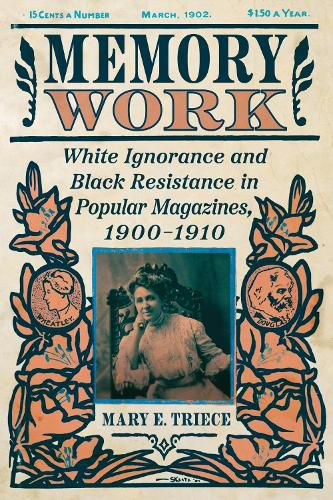Readings Newsletter
Become a Readings Member to make your shopping experience even easier.
Sign in or sign up for free!
You’re not far away from qualifying for FREE standard shipping within Australia
You’ve qualified for FREE standard shipping within Australia
The cart is loading…






In the early twentieth century, white-controlled magazines and Black magazines told very different stories about the dynamics of race, sex, and power in the United States. Memory Work: White Ignorance and Black Resistance in Popular Magazines, 1900-1910 examines how popular magazines employed rhetorical strategies to remember, forget, and frame America's racist past. White-controlled magazines such as the Independent, Outlook, Arena, and McClure's carried stories of southern nostalgia, union reconciliation, and white purity. Relying on willful ignorance to misremember past experiences of suffering, these texts severed violent histories from present-day policies and often simply remained silent. Meanwhile, in Black magazines such as the Colored American Magazine and the Voice of the Negro, women writers leveraged countermemory. Bringing Black women's accomplishments into focus, these writers inverted popular white narratives that erased and obscured Black women's experiences, including those of sexual violence.
Mary E. Triece traces how white and Black magazines-often in dialogue with one another-differently engaged memory work to either reinforce or upend white supremacy during a period of both Black advancement and white backlash. Further, the book suggests lines of connection between the construction of public memory in the past to those taking place today across an array of media platforms. Popular debates-whether appearing in early 1900s magazines or on twenty-first-century social media sites-shape a culture's collective knowledge of what counts as true, important, and worthy of attention.
$9.00 standard shipping within Australia
FREE standard shipping within Australia for orders over $100.00
Express & International shipping calculated at checkout
In the early twentieth century, white-controlled magazines and Black magazines told very different stories about the dynamics of race, sex, and power in the United States. Memory Work: White Ignorance and Black Resistance in Popular Magazines, 1900-1910 examines how popular magazines employed rhetorical strategies to remember, forget, and frame America's racist past. White-controlled magazines such as the Independent, Outlook, Arena, and McClure's carried stories of southern nostalgia, union reconciliation, and white purity. Relying on willful ignorance to misremember past experiences of suffering, these texts severed violent histories from present-day policies and often simply remained silent. Meanwhile, in Black magazines such as the Colored American Magazine and the Voice of the Negro, women writers leveraged countermemory. Bringing Black women's accomplishments into focus, these writers inverted popular white narratives that erased and obscured Black women's experiences, including those of sexual violence.
Mary E. Triece traces how white and Black magazines-often in dialogue with one another-differently engaged memory work to either reinforce or upend white supremacy during a period of both Black advancement and white backlash. Further, the book suggests lines of connection between the construction of public memory in the past to those taking place today across an array of media platforms. Popular debates-whether appearing in early 1900s magazines or on twenty-first-century social media sites-shape a culture's collective knowledge of what counts as true, important, and worthy of attention.